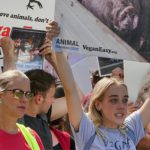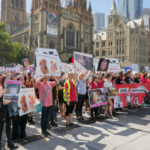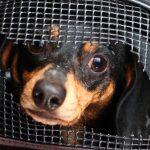Against Animal Atrocities: An Interview With Animal Justice Party MLC Emma Hurst

Newly-appointed federal agricultural minister Bridget McKenzie has vowed to crack down on “agri-terrorists”. Indeed, following nationwide nonviolent animal welfare protests in April, McKenzie said she wanted to see laws similar to the US, where animal activists face steep prison time.
Animal advocates assert that likening them to violent extremists is a way for government to discredit their cause. And in an attempt to further criminalise them, McKenzie now plans to fast track laws that will see them imprisoned for up to 12 months for disclosing information about agribusiness.
In NSW, the Liberal Nationals have been operating in much the same way. In 2015, the government oversaw the passing of the Biosecurity Act, which ostensibly sought to manage biosecurity threats on farms and agribusinesses, however it also serves to prohibit animal activists from filming.
The Animal Justice Party has pointed out that these ag-gag laws contain such a broad definition of a biosecurity matter carrier that it includes an activist and their equipment. And the penalties that apply for filming at a factory farm are a fine of $1.1 million or up to 3 years imprisonment.
Eradicating more than protections
Following its March election win, the Berejiklian government scrapped the Office of the Environment and Heritage, leaving the environment portfolio to be subsumed by NSW Planning. This is a move that will see environmental protections taking a back seat to development.
The Coalition had already set about dismantling environmental protections when it repealed the Threatened Species Conservation Act 1995, along with the Native Vegetation Act 2003. This has led to a daily destruction rate of around fourteen football fields of koala habitat.
These measures are leading to the eradication of the koala in NSW, with fears it could be extinct by 2050. A state parliamentary inquiry into saving the koala was launched last week, which aims to assess the impact of logging, land clearing and the climate emergency.
The dogs still race
In mid-2016, the Baird government announced there would be a ban on greyhound racing effective July 2017. The decision came after a special commission of inquiry found tens of thousands of dogs die each year, while the use of live animals as bait continues.
However, Mike Baird reversed the ban months later, claiming that he “got it wrong” and most of the community wanted greyhound racing to stay. While figures last year revealed that the number of canines killed and injured as a result of racing continues to rise.
Recently-elected NSW Animal Justice Party MLC Emma Hurst explained in an August 2018 article that around 18,000 greyhounds are killed as a result of the industry each year. And she made clear that “until this barbaric and bloody business is outlawed”, they’ll continue to die.
Sydney Criminal Lawyers spoke to Ms Hurst about the rising number of conservative politicians that are concerned about animal welfare, her assertion that ag-gag laws are not effective and how she expects progress soon in the area of animals used for entertainment.
Firstly, you were elected as the second Animal Justice Party (AJP) member of the NSW Legislative Council in the March state election. Ms Hurst, would you say your addition to parliament is a sign that animal welfare has become more of a community focus?
A recent report commissioned by the federal Department of Agriculture – Australia’s Shifting Mindset on Farm Animal Welfare – revealed what the Animal Justice Party has always known: that the majority of Australians care about animals.
The report found that 95 percent of respondents viewed farmed animal welfare with concern, and 91 percent want reform.
The AJP now have three MPs elected to parliament: one in Victoria and two in NSW. Never has it been so clear that Australians care about animals and want to see legislative protection.
How would you say another four years of the Berejiklian government bodes for the environment and wildlife in this state if the government continues on in the same manner it has been?
We are in a very worrying situation. The government has a poor track record on animal and environmental protection, but that’s exactly what the AJP are hoping both to challenge and to change. We will be doing all we can to protect our native wildlife and natural habitats.
My colleague, Mark Pearson, has been elected to the Environment portfolio committee and they are already initiating an inquiry into koala protection. We are also researching issues for wombats and macropods in NSW.
The Biosecurity Act was passed in September 2015, which effectively serves to silence those who want to expose factory farm cruelty. What do you think about the scope of these ag-gag laws?
The initiation of ag-gag laws in NSW is a worry. It suggests to me that the agribusiness industry is nervous about transparency and want to ensure consumers remain unaware of the treatment of animals in intensive farming.
Having said that, I think such laws will likely backfire. They are unlikely to deter advocates from exposing animal cruelty and consumers are becoming more wary of the reasons behind agribusiness for wanting to hide farming practices.
People are independently going online and finding out for themselves. And I think push back from agribusiness will, over time, create more curiosity and consumer awareness.
These days, there’s not as much talk about the issue of greyhound racing as there used to be, despite the number of deaths and injuries as a result of it being on the rise. Is greyhound racing an issue voters should expect to reappear on the political agenda?
Greyhound racing will continue to come up in debate. The Special Commission of Inquiry into the Greyhound Racing Industry report found that the industry had, “‘fundamental animal welfare issues, integrity and governance failings that can not be remedied.”
I emphasise “can not” be remedied. Where something can not be fixed, and animal welfare issues are systemic, it means we will constantly see this issue in the news, similar to the debate on live exports.
We will see cruelty case after cruelty case ad nauseam. I don’t think this is a matter of if greyhound racing will ever be banned in NSW, but rather, when.
As we’ve discussed before, there seems to be a rising trend amongst conservative politicians in associating animal rights/vegan activists with terrorists, as well as passing laws to crack down on their activities.
Why has the animal rights movement recently become more of a target for governments?
The agribusiness industry is very wealthy and has been lobbying governments for years. I’ve had some really interesting conversations with many conservatives on the right though, and I don’t feel that this push against consumer knowledge and animal protection is supported by all conservatives.
In fact, I think it will divide them as many right-wing conservatives are starting to look a little closer and they themselves are questioning some cruel practices on animals.
But as they say, “first they ignore you, then they laugh at you, then they fight you, then you win”. Winning for animals is coming closer every day.
There’s a growing acknowledgement that animal agriculture is one of the leading causes of the climate emergency. Would you say the increasing awareness around this issue is leading more individuals to get on board with the animal rights/vegan movement?
Yes, we see a lot of our members getting involved for both animal and environmental protection issues. And we hear a lot of people electing to follow a plant-based diet for ethical, environmental and health reasons, or a combination of all.
It is an AJP priority that urgent action be taken to address global climate destabilisation.
Our solution includes protecting existing forests and marine habitats from further destruction, rapidly transforming Australian agriculture to allow reforestation by reducing grazing, along with clean energy solutions, sustainable plant-based food agriculture systems and education.
And lastly, Ms Hurst, you’ve just begun your eight year term in the NSW Legislative Council. Besides the issues we’ve just discussed, what are some of the others you’ll be focusing on? And what do you think can be achieved over that time?
Millions of hens are still permanently confined in battery cages where they have about the same amount of room as an iPad. They live on hard wire flooring and can’t even stretch their wings. We are working to end the battery cage farming system.
There is also no welfare monitoring in the commercial killing of kangaroos. The mass commercial slaughter of our national emblem is the largest land-based massacre in the world. We are calling for an urgent review of the industry and a rapid phase out of the commercial killing of kangaroos.
We are also working with several animal groups to see an end to the use of dolphins, whales, and circus animals in entertainment. Considering the traction and attention overseas. I am confident we may see some progress in this space over the next year or two.







